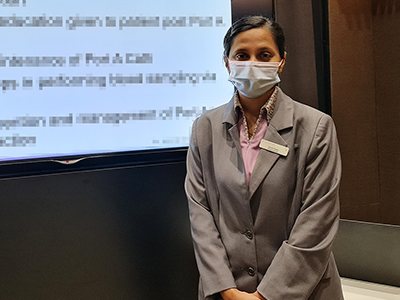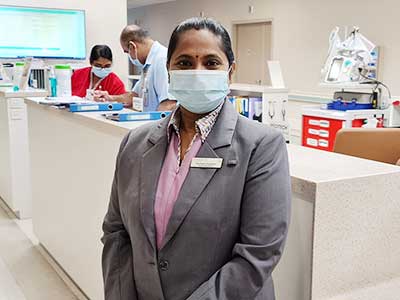.2022-07-25-10-36-18.jpg)
Armed with an intrinsic passion to serve and a fond memory of his nursing aunt whom he describes as “excellent clinician with outstanding leadership and administrative abilities”, Assistant Nurse Clinician Nicholas Zhu entered emergency nursing for a career that is both engaging and, challenging while allowing him to make a difference in the lives of others.
“My aunt would share with me her clinical work experience in the hospital, during her early days in nursing,” Nicholas recollects fondly. “Her experience spans the different areas in the public healthcare cluster”. That’s the kind of well-rounded exposure that I want to emulate.”
Thanks to the positive example set by his aunt, Nicholas’ parents were supportive of his eventual career choice. They knew that I wanted to be equipped with an essential knowledge and skills, doing something related to healthcare. A job that is non-routine and not your typical daily office work. It just so happened that emergency nursing was a nice blend of these areas. It was a very natural career choice for me,” he added.
Graduating with a Bachelor of Science in Nursing, Nicholas officially stepped into his new role in 2013. Though nearly a decade has passed, Nicholas is still going strong, ever ready to embrace new things and seize new opportunities for growth.
“Emergency nursing is a very people-centric job. Patients do not typically stay in the emergency room for long and the turnover rates are high. It gives me the opportunity to meet people from different walks of life and that takes me out of my comfort zone. The experience of managing critical patients who are in distress and in need of urgent treatment, it’s all very humbling,”.
During the start of the pandemic, Nicholas and the team of doctors and nurses at the Medical Urgency Clinic were part of the frontline staff managing the nationwide COVID-19 outbreak. As an Emergency Room staff, the nurses are like the “gate-keepers” of the hospital making sure patients are screened and clinically managed in accordance to strict infection control protocols.
Healthcare staff in Medical Urgency Clinic are expected to adhere to strict infection control practices. Nicholas mentioned, "Although donning PPE for long hours can be uncomfortable, I reminded myself to stay vigilant as healthcare workers are entrusted with the responsibility of keeping not only the patients but also to the people around them safe”.
As the number of COVID-19 cases rose, the Medical Urgency Clinic was actively supporting the COVID-19 swab operations and vaccination programs in addition to its daily clinical operation.
He mentioned that due to this additional services provided by Medical Urgency Clinic, staff from other departments were roped in to support this operation. “We were always drenched in sweat when we degowned our PPE and I am very thankful for their hard work and contribution”.
As an emergency nurse, Nicholas readily admits that working in an emergency clinical setting may not be everyone’s cup of tea.
“Being quick on your feet is critical in the MUC. You also need to be capable of making accurate assessments and be decisive in your clinical management,” Nicholas stressed as he described a typical day at work.
As an emergency nurse, you have to be very observant of the patients and your surroundings. You have to be quick and accurate in your acute assessment of your patient, managing them in order of their priority. Every second counts for critically-ill patients wheeled through the emergency doors, making the hours unpredictable.
Nicholas shared with his juniors, “In the emergency room we can’t anticipate which hour of the day or which day is busy. We have to always be ready to receive critically-ill patients.”
He shared that in EC, we are always operating 24/7 providing medical care for anyone who walks in.
According to Nicholas, experienced nurses are typically rostered for the night out of necessity. The graveyard shifts are when there are less hands on deck at the clinic. Patients who seek immediate medical treatment at those hours are usually critically-ill, making the stakes even higher.
Despite Nicholas’ high level of competence and wealth of experience in public hospital emergency department, the emergency room has limited resources and a smaller window for stabilizing and treating patients. Beyond having protocols down to triage patient acuity category (PAC), Emergency nurses must also deal with unforeseen circumstances, such as a sudden influx of patients or unruly abusive patients.
He recalled his experience in public emergency department when non-emergency cases misused and abused emergency services depriving critically ill patients from the manpower and resources available in emergency department.
Knowing how to prioritize patients and resources is critical to mitigating these potentially life-threatening circumstances. To do so, Nicholas needs to have resourceful information at his fingertips at all times, even amidst the flurry of activity in the emergency department.
He explained the importance of keeping calm even when patients become unruly from having to endure long waiting times. “Though they can get nasty at the Emergency department, we are always mindful to explain the situation calmly. Some get it, some don’t. Ultimately, it is our job to de-escalate the situation since such behaviors can be quite stressful for the doctors and nurses in the Emergency department.”
The fast-paced, challenging nature of emergency nursing is exactly what drew Nicholas in after just one year of working in the wards, “Knowing that I could be assigned anything from triage duties to the resuscitation bay keeps me on my toes. I enjoyed this area of nursing so much that I completed an advanced diploma for Emergency Nursing in 2014.”
Besides classroom learning, Nicholas also relishes any opportunity to lend assistance at onsite emergencies. He regards these as opportunities to apply what he has learned.
“The hospital that I worked in during my early days as an emergency nurse received high volume of critically-ill medical cases and due to the hospital location, it also has a fair number of traumatic, and industrial cases. That was when I was given the opportunity to work on crisis and disaster management with the Ministry of Health. That gave me the chance to participate in both MOH local and overseas exercises where I handled real-time medical coverage for national events,” he recounted.
Nicholas keeps in touch with his peers, emergency doctors and nurses in other hospitals, keeping himself updated with the latest protocols and evidence-based practices in the emergency department. Nicholas regularly conducts formal teachings for his colleagues in the EC and healthcare members outside of EC.
“Having had mentors who are really patient as well as mentors who prefer to throw you in the deep end to practice independently, I personally find that I had the best of both worlds and it has moulded me to be the person and clinician that I am today,” he elaborated as he recalled his early days of practice.
A decade into the role, the title of ‘nurse’ means a lot more to Nicholas than a mere paper qualification. His next aspiration is to guide the younger nurses. “I hope nurses can serve with passion and push the boundaries of nursing practice to a higher level, making a difference in a patient’s healing journey.”
Of course, one cannot take care of others without first taking care of themselves. That’s why Nicholas always ensures that he gets enough rest, exercise and keeps a watchful eye over his nutritional intake. But above all, he always reminds himself to serve with passion. The slogan “Do it with your heart” written across his roll call serves as his daily reminder to maintain a positive attitude.
“Somebody has to do this job. Besides, it’s something that I signed up for. Nursing is undoubtedly a challenging career, and there will always be good and bad days. However, the way I see it, bad days are the ones that toughen us and make us better.

Helping To Make Chemotherapy a Little Less Daunting
They say that nursing is a career of compassion, and no one embodies this better than Sarah Sharmala, Nurse Educator and a certified oncology nurse.
Read her story

Passion for Nursing Burns Bright Even After Nearly 20 Years
A stalwart with over two decades of experience in handling oncological, surgical, and medical patients, Karthiga Vinayagam exemplifies how one’s passion for nursing does not have to diminish with time.
Read her story